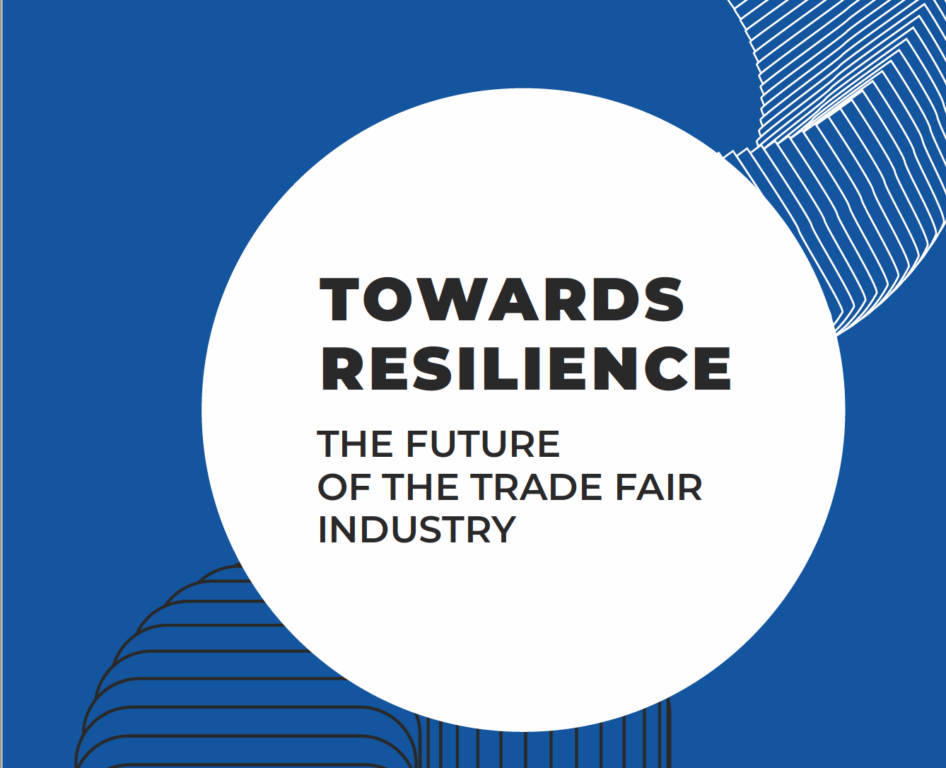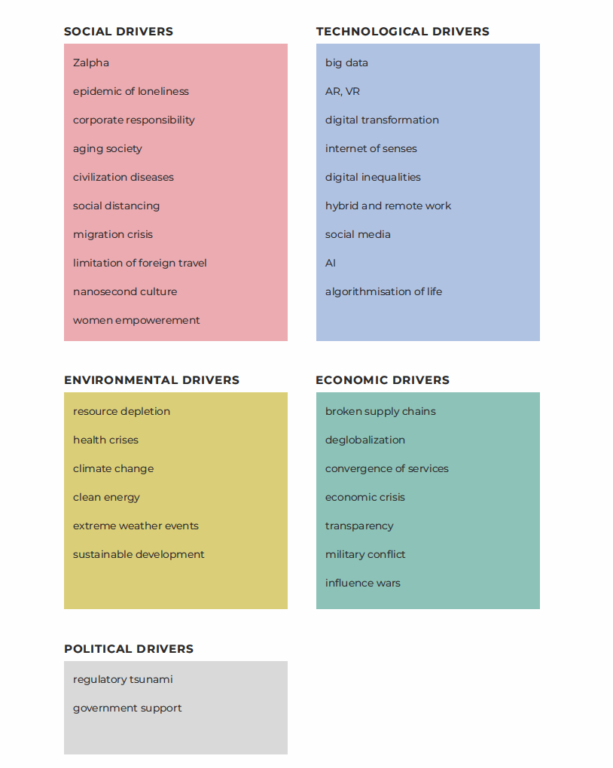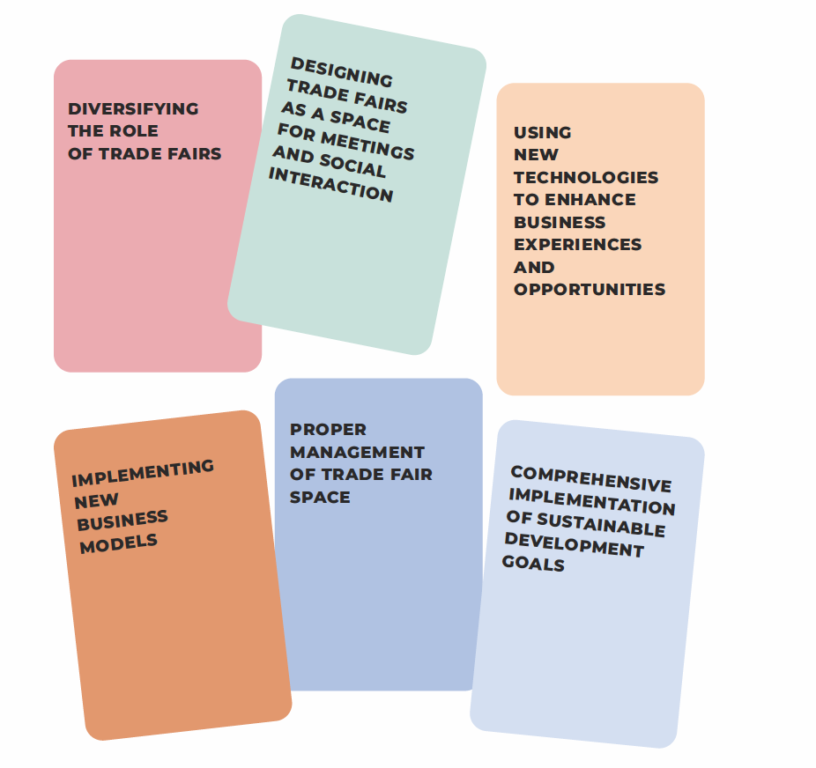Towards Resilience. The Future of The Trade Fair Industry
The industry of MICE (meetings, incentives, conferences, exhibitions) is an important part of the economy. In Poland alone, it accounts for 1.5% of GDP², while the global value of the market just before the pandemic (in 2019) was valued at $1.2 billion³. At the same time, it is the industry that has been most affected by the COVID-19 pandemic. As a result, the Polish companies operating in the meetings and events industry saw their revenues fall by 73%⁴ in 2020.

Resilience – ability needed
Resilience is the ability to adapt to changing conditions regardless of their magnitude or force; the ability to recover quickly from loss or being weakened; buoyancy; the power to bounce back quickly. It is is crucial, not only in meetings, but also in business in institutions.
The COVID-19 pandemic has significantly accelerated the digital transformation of the industry of MICE, although it must be stressed that these changes feel more like an organic ‘grafting’, introduced by trial and error in a situation of the prevailing crisis. When we additionally take into account issues such as deglobalisation, climate transformation and demographic change, it becomes clear that the category of exhibition and trade fair has found itself in a situation where the role and function of trade fairs is bound to drastically change.
Drivers For Change
The exhibition industry does not operate in a vacuum. For this reason, in addition to the industry specific challenges listed above, it is necessary to take into account a wider context. On the basis of legacy data, as well as expert interviews and qualitative workshops conducted, the drivers that have or will have an impact on the changes taking place in the exhibition industry have been diagnosed. They are featured in the graphic below.
The four most frequently occurring factors were successively: Zalpha (a societal factor taking into account the influence of the two currently youngest generations, Generation Z and Alpha), big data (a technological factor related to the huge amount of data generated in the digital world), broken supply chains (an economic factor, the bottleneck in logistics and production exacerbated by the pandemic and – currently – by sanctions related to the war in Ukraine) and running out of resources (an environmental factor, related to the commodity crisis).
All these drivers for change have been taken into account as a starting point for the construction of the scenarios.

Challengers that the industry is facing
There are two prisms through which one can approach the challenges that the industry is facing. On the one hand, we have got the aforementioned macro-factors (deglobalisation, climate transformation, demographic change, dynamic technological development – read more on the matter in section 1.2 and Chapter 2.) On the other hand, we are noticing the in-dustry’s internal business challenges, typical only for that particular industry, yet most certainly being a result of macro factors. As an outcome of the analysis of the qualitative and quantitative research conducted for the purpose of this report, the infuture.institute team has defined the six main challenges.
They are as follows:

Executive Summary
- We are used to dividing those present at trade fairs into the exhibitors and the visitors (including individual and business-oriented). However, apart from their role or position, the visitors are also defined by their age, whether they have children, their disposition (introvert, extrovert) or interests. However, it should be remembered that despite all the differences, they all form a system of communicating vessels, while fulfilling the needs of one group affects the experience of the other. Today, at fairs we already come across offers for parents (special playgrounds for children with guardians or educational activities, e.g., in the form of workshops), as well as special offers for neurodiverse individuals (e.g., at Expo 2020 Dubai quiet spaces were arranged for those on the autism spectrum.)
- The research reveals that one of the most important needs realised by visitors and exhibitorsat trade fairs is the need to network and nurture relationships with others. Maintaining contacts with the trade fair community have to be maintained also outside the regular meetings in the exhibition space (fairs following a specific schedule) – through additional activities for specific groups of exhibitors or visitors (e.g., creating social media groups around the theme of the fair, asking for feedback and involving them in the creation of new solutions).
- Trade fairs should perform a city-forming role. The design of trade fair spaces should resemble cities – they should be dense and taking into account the needs of all inhabitants. One of the phases of such change is the reduction of so-called non-places, i.e., no-man’s spaces¹ by turning them into those with specific functions and purpose, so that they evoke positive emotions in visitors.
- Technologies employed at trade fairs should be a tool that supports exhibitors in presenting their products and services. Therefore, they should be useful, reliable and accessible. They should support the presentation and understanding of the content, and not be an attraction per se.
- Although the pandemic has forced some activities to move to the online world, modern technologies still do not enable experiencing the digital world in a multi-sensory way. However, works to develop such technologies are ongoing. Therefore, it becomes necessary to gradually educate the visitors and the exhibitors, and implement certain elements of the latest technologies so that the integration of the elements of the Metaverse* world into the MICE industry would be smooth and based on the needs of real-world audiences (multisensory, relationship-building, engaging experiences.)
- Trade fair venues should move towards building energy, water, and digital self-sufficiency. These operations should be permanently inscribed in the strategy and constantly reviewed. They should also fit in with the 17 Sustainable Development Goals (including, among others, actions against climate change and its effects, building global partnerships for sustainable development, inclusive and stable economic growth, good quality of life.)
- At present, we are struggling with numerous various crises (climate, economic, health, war in Ukraine). It is now necessary to learn how to manage the change and adapt to an evolving environment in a flexible manner. It is necessary to think two-fold: no a short-term basis (allowing for quick reactions), as well as on a long-term basis (allowing for building resilience and preparing for future challenges). It is necessary to adopt the approach of a new normal rather than holding back, waiting for the return of the patterns one had been accustomed to prior to the emergence of the crises.
Methodology
In the course of the work on the project related to the future of the trade fair industry, infuture.institute has conducted an analysis of historical signals of change (in-depth analysis of legacy data, reports, articles and other sources on the future of the MICE industry, including strategic reports) and the following qualitative and quantitative research:
- Qualitative workshop with the Grupa MTP – The aim of an all-day workshop with representatives of the MTP Group was to learn about their perspective of the present functioning of the trade fair industry and to define the main factors influencing the changes conductive to its future. The meeting was attended by specialists in the areas of digitalisation, product management, commercialisation, as well as communication and PR.
- Expert interviews – Nine expert interviews were conducted with a set goal of determining the most important drivers for change affecting the future of the meetings industry and to identify the most vital challenges and opportunities facing the industry in the upcoming years.
- Visual ethnography – An analysis in the vein of visual ethnography was conducted based on field research conducted at trade fairs and industry events (London Design Biennale, Design Week Milan, DLD Tel Aviv, Art Biennale Venezia, Dubai Expo 2020, Dutch Design Week). It has constituted the basis for defining the main functions fulfilled by trade fair venues.
- Quantitative survey (CAWI) – As part of the research process, infuture.institute has conducted a quantitative survey among persons who had attended trade fairs in the last five years. The research took the form of an online survey. The invitation to the survey, along with a link, was sent to the exhibitors and visitors from the database owned by MTP. The survey was conducted between 10 February 2022 and 4 March 2022. Altogether, 190 exhibitors and 171 visitors have taken part in the survey. The survey’s goal was to find out the needs, motivations and opinions on different types of trade fairs.
- Future scenarios – In the first step of the analysis, four directions of change were defined (status quo, growth, collapse, transformation.) At that stage, a pyramid of disruptions was also created, which demonstrated the impact of a given type of scenario on areas of business operation. Next, during a research process, the most vital drivers for change were diagnosed that have (or will have) an impact on the disruption of the trade fair industry. They became the basis for building detailed scenarios of the future. What followed was a third step which assumed assigning the created scenarios to the overarching types of scenarios – A, B, C or D. The final step was to subject the scenarios to expert evaluation.



